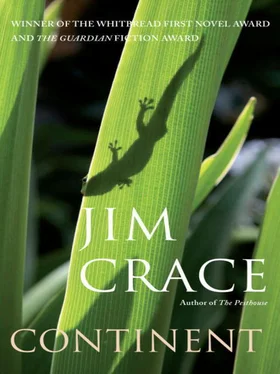ONCE a year, at high tide on the longest day, the tiger crabs come ashore to mate. They come in their millions, as docile and purposeful as pilgrims. Nowadays the solstice is a national holiday and the coast is swarming with people, too. They inspect the striped and shifting shingle of the beach and lift the plumpest crabs for the pot.
But when we were young the beach was free and empty. We helped my father with his plate camera. We collected swabs of sperm. We measured carapaces and pincers. We marked the shells of specimens in indelible ink. Father introduced us as his ‘young research assistants’ whenever the kelp-farmers or the fishermen paused to stare. His book was published in 1928 and, thereafter, we stopped coming to the solstice beach. He was too busy at the Institute and travelling abroad. But we were mentioned in the preface and thanked for our ‘tireless field work’ — and the new edition carries a photograph of the family, taken in 1926. My two younger sisters, fat and cheerful, are shaking crabs at the camera. My mother, dressed from throat to ankle in a then-fashionable bandok, is sitting cross-legged in the centre of our lunch rug. A book in her lap. A look of explosive irritation on her face. My father, his head turned against the wind, his eyes narrowed, is pointing at the camera and shouting instructions to the enlisted fisherman on how to focus and what to press. I am standing at father’s side — an awkward, bony twelve-year-old in a torn and spermy dress. Before and beyond us, reduced to stones by this still, black-and-white photograph, are the tiger crabs. Uca felix , father called them. Lucky crabs. Free from the tyrannies of courtship and concupiscence.
‘What is the mechanism which causes Uca felix to mate en masse on this single day?’ asks father in the foreword to The Secret Life of the Tiger Crab. ‘ What is the chemistry of its procreative regularity?’ His book does not provide the answers. Its popular appeal lay in the final chapters where father contrasted the rigid breeding behaviour of the crab with the uneven profligacy of human kind. Nature is always patterned, he said. It was his theory — and regret — that the sexual life of Homo sapiens functioned in a state of disorder, ‘outside of nature’.
MY FATHER died in 1940. My mother, in a gesture which was both ironic and dutiful, buried him in a weighted casket just above the high-tide mark and planted a salt bush to mark the spot. The Institute put up a raised stone tablet with an inscription:
PROFESSOR T. D. ZOEA
1879–1940
Writer and Natural Scientist
There is a photograph of this, too, at the back of the new edition.
A THIRD photograph was not included, despite its combative prominence in my father’s study. How he loved that photograph and how we feared it. Its date was 1912. My mother and father stood like big-game hunters, striking poses for the long exposure of the filmplate in the darkness of the trees. All around them, blurred by impatience and playfulness, were a host of forest women, their arms latticed with cicatrices, their stomachs bulbous, their hilarity bombarding the grimness of my parents. ‘All Pregnant and Correct’ was my father’s title for the photograph. But my mother — and we three girls in our turn — found the laughing herd of women, their polished breasts and stomachs crowding the frame, oppressive.
‘That was taken during the expedition,’ my mother explained in those weeks when her illness made her reckless. ‘The Professor and I had just married. I liked him enough to travel with him in those days. We rode on donkeys for eight weeks from the railhead at Etar. He was noting species and I was logging them for him in the yellow ledger. I wrote “Two donkeys” at the head of each day’s list, and then the names that he called to me whenever there was movement in the undergrowth. It was as if we were not married, but still teacher and doting student … except that the Professor wanted sexual conjunction all the time, on the thinnest of pretexts. The moment we dismounted from our donkeys for rest or food the Professor would become attentive in that breathless, urgent way which so transformed him and so reduced him.’
We drew from her a portrait of my father made tense and engrossed by my mother’s presence, as if his self-control had been agitated by the bounce of the donkey. At night in their tent, with the moth lamp burning and the camp flaps shaking a beat, he would again go to her, saying, ‘Let me warm you’ or ‘You are beautiful in this light’ or ‘Hold me there.’ At his most wheedling, his speech would be, ‘Tonight I am tired. Take it in your hand and rub me to sleep.’ At his boldest, he briefly left the tent and returned like some foolish stranger to push money into her hand and say, ‘Be a whore for me. Pull up your night-clothes.’ Sometimes there would be tears of shame, too. But for them the only remedy was more conjunction. ‘Now we are married we can make love,’ he told her, ‘at any time.’ ‘Like animals,’ she said, meaning to tease him but also, perhaps, to induce a little forbearance and composure when next his tumescence demanded her attention. ‘No, not like animals,’ he said. ‘The very opposite to animals with their seasons, their ruts, their “heats,” slaves to chemistry. No, it is this which separates us from the animals, our capacity to enjoy our bodies as the whim takes us, ever receptive to pleasure. Any place, any time. Now, for instance?’
‘IN THE eighth week we came deep into the forest where the people had made clearings for plantation,’ said mother. ‘The villagers there were naked by day and the Professor was much charmed by their innocence. He took notes, of course, as if the villagers were bats or beetles, and he was struck by the absence of sexual playfulness or arousal. “They are immodest like infants,” he wrote in the ledger. But all our observations seemed inconsequential once the villagers had become used to our presence and their women felt free to go about their business. As you can see from the photograph, all of them except the children and the elderly were pregnant. Not surprising, perhaps, in a society where there were few constraints on fertility. But look closely at the women. Here is the oddity which so engaged the Professor. All these women are over eight months pregnant and they are ready to produce offspring in near unison.’
This observation set my father’s mind racing. Birth in unison indicated conception in unison, the impregnation of the village’s fertile women in one concentrated period of communal — if not public — sexual intercourse. What could be the purpose of such a congress? And were the mechanisms of its control social or biological? ‘The Professor, to my cost, found the subject stimulating in every way,’ complained mother. ‘But there were lessons there for me also. I determined that the moment we returned to the city I would take charge of our conjugal lives. We would economize.’
NOW consider this. A trapper from the valley whom my father employed to transport his specimens and supplies to and from Etar claimed to understand a little ‘forest’, a tongue so labio-plosive that linguists had titled it vabap-vabap. To hear it spoken in jostling conversation was to hear a flock of doves take wing. The trapper had been hunting amongst these same trees four years previously. And he had witnessed — had, indeed, participated in — a period of communal sexual intercourse amongst the small forest community with whom my parents were now lodged. ‘You imagine them to be simple and cold,’ he said, recounting his many previous attempts to find or buy a partner amongst the native women. ‘Lovemaking does not interest them, it seems. But when their moment comes they are like dogs in heat.’ I will not recount the scenes which he described or comment, either, on the opportunism of the trapper. After three days their sexual agitation, however, was reported to have ceased as readily and as inexplicably as it had begun. ‘And the women with whom you had consorted?’ asked my father. ‘How many women … personally, may I ask … in those three days?’ The man’s reply is marked in my father’s ledger and heavily circled. ‘Fourteen!’
Читать дальше












